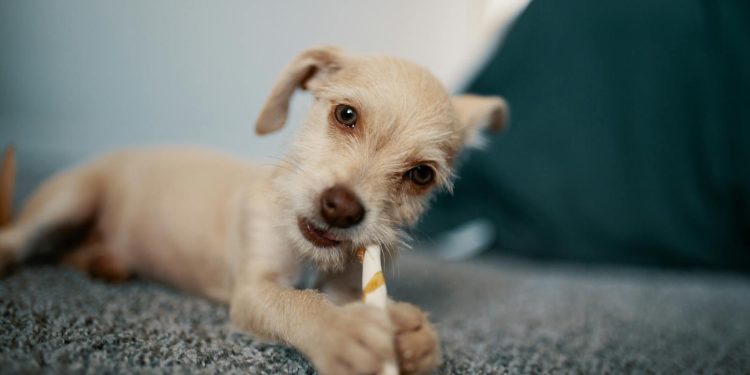Chewing is a natural behavior for dogs, but it can be incredibly frustrating when your pet decides to chew on your favorite shoes, furniture, or even electrical cords. While destructive chewing can be exasperating for owners, it’s important to remember that dogs don’t chew out of spite or malice. There are many reasons behind this behavior, and with a little patience and understanding, you can guide your dog toward more appropriate chewing habits. This article will explore why dogs chew everything in sight and offer practical tips to help prevent destructive chewing.
Understanding Why Dogs Chew
To effectively address destructive chewing, it’s crucial to understand why dogs chew in the first place. Chewing is an instinctual behavior for dogs, and they engage in it for various reasons:
- Teething: Puppies go through a teething phase between three weeks and six months of age. During this time, chewing helps relieve the discomfort caused by new teeth coming in. It’s not uncommon for puppies to chew on anything they can find to help soothe their sore gums.
- Exploration: Dogs explore the world with their mouths. Chewing allows them to learn more about their environment, especially during puppyhood. It’s how they investigate new objects and get a sense of texture, taste, and durability.
- Boredom: A bored dog is more likely to resort to chewing as a way to entertain themselves. Without enough mental and physical stimulation, dogs can turn to chewing out of sheer boredom.
- Anxiety or Stress: Dogs can use chewing as a coping mechanism when they are anxious or stressed. This is often seen in dogs with separation anxiety, who might chew on door frames, furniture, or personal items when their owner leaves the house.
- Attention-Seeking Behavior: Some dogs learn that chewing on household items grabs their owner’s attention. Even if the response is negative, such as scolding, the dog might find it rewarding because it brings interaction.
- Hunger or Nutritional Deficiency: Occasionally, dogs chew on non-food items because they are hungry or lacking certain nutrients. This type of behavior is known as pica, and it might require veterinary attention if it becomes severe.
Tips to Prevent Destructive Chewing
The good news is that with consistent training and the right approach, you can prevent your dog from chewing on inappropriate items. Here are some practical strategies to help you manage and prevent destructive chewing:
Provide Appropriate Chew Toys
One of the most effective ways to curb destructive chewing is to provide plenty of appropriate alternatives. Chew toys come in all shapes and sizes, and offering a variety can help satisfy your dog’s chewing needs.
- Durable Toys: Make sure to provide toys that are durable and designed for your dog’s size and chewing strength. Toys like KONGs, Nylabones, and other sturdy chew toys are great for heavy chewers.
- Rotating Toys: Dogs can get bored with toys if they’re always the same. Keep your dog’s interest by rotating their chew toys regularly. Introducing a new toy every few days can keep things exciting and prevent them from losing interest.
- Edible Chews: Providing edible chews like bully sticks or dental chews can also help satisfy your dog’s urge to chew. Just make sure that any edible chew you offer is safe and appropriate for your dog’s size and chewing habits.
Puppy-Proof Your Home
If you have a puppy, it’s essential to set up your environment for success. Puppy-proofing your home can help prevent inappropriate chewing during the exploratory phase.
- Remove Tempting Items: Keep shoes, clothes, cords, and other tempting objects out of reach. Store items in closed closets or behind doors to limit your dog’s access.
- Block Access to Off-Limit Areas: Use baby gates to block off areas of the house where your dog tends to find things to chew. This helps reduce their opportunities to get into trouble.
Supervise and Redirect
When training a dog not to chew on inappropriate items, supervision is key. If you catch your dog chewing on something they shouldn’t be, it’s important to redirect them to an appropriate item.
- Redirection: Calmly take the inappropriate item away and immediately give your dog a chew toy. When they start chewing on the toy, praise them and offer positive reinforcement. This teaches your dog that chewing on their toys leads to good outcomes, while chewing on other things does not.
- Supervised Time: When you can’t supervise your dog directly, consider using a crate or a playpen to prevent them from accessing off-limit areas. Make sure to provide appropriate toys inside their crate to keep them entertained.
Provide Plenty of Physical and Mental Stimulation
A well-exercised dog is less likely to develop destructive habits, including chewing. Ensuring that your dog gets enough physical exercise and mental stimulation can go a long way toward reducing problem behaviors.
- Daily Exercise: Depending on your dog’s breed and age, they may require a significant amount of exercise each day. Regular walks, runs, or play sessions can help tire them out and reduce the desire to chew out of boredom.
- Mental Stimulation: Mental exercise is just as important as physical exercise. Puzzle toys, training sessions, and interactive games can help keep your dog’s mind engaged and reduce boredom-induced chewing. Dogs need a job or a purpose, and providing them with mentally stimulating activities helps fulfill that need.
Use Deterrent Sprays
If your dog tends to chew on specific items, such as furniture legs or electrical cords, deterrent sprays can be an effective tool to discourage this behavior.
- Bitter Apple Spray: Products like bitter apple spray are designed to have an unpleasant taste, deterring your dog from chewing on sprayed items. Make sure to test a small area first to ensure it won’t damage furniture or upholstery.
- Consistent Application: Consistency is important when using deterrents. You may need to reapply the spray frequently, especially at first, to create a lasting aversion to the item.
Avoid Punishment
It can be tempting to scold your dog when they chew on something valuable, but punishment is generally not effective for curbing chewing behavior. Yelling or physically punishing your dog can lead to increased anxiety, which might make the problem worse. Instead, focus on positive reinforcement and redirection.
- Redirect to Appropriate Behavior: When your dog chews on something they shouldn’t, gently take the item away and redirect them to an appropriate chew toy. Offer plenty of praise when they choose the correct item.
- Patience is Key: Training takes time, especially for younger dogs or those with ingrained habits. Patience and consistency will lead to better long-term results.
Crate Training and Confinement
For some dogs, confinement can be an effective strategy for preventing destructive chewing when they are left alone. A crate can serve as a safe space where your dog can relax without the temptation of chewing inappropriate items.
- Positive Crate Training: Crate training should always be approached in a positive manner. The crate should be a place of comfort and safety, not punishment. Add soft bedding and a few toys to make it inviting.
- Gradual Acclimation: Start by getting your dog used to spending short periods of time in the crate while you are at home. Gradually increase the time they spend inside until they are comfortable being crated when you are away.
Consider Underlying Issues
If your dog’s chewing is extreme or seems compulsive, it could indicate an underlying issue such as anxiety or a nutritional deficiency.
- Consult Your Veterinarian: If you’re concerned that anxiety or a medical issue may be contributing to your dog’s destructive chewing, consult your veterinarian. They can rule out any health problems and may recommend behavioral interventions or medication if needed.
- Address Anxiety: Dogs with separation anxiety often chew as a way to cope with stress. Addressing the root cause of anxiety with gradual desensitization and counterconditioning can help reduce destructive behaviors. In some cases, a veterinary behaviorist may be needed.
Conclusion
Chewing is a natural and necessary behavior for dogs, but it can become problematic when directed toward inappropriate items. By understanding why dogs chew and providing them with the right outlets for this behavior, you can help prevent destruction and create a happier environment for both you and your pet. Providing appropriate chew toys, reducing boredom, and using positive reinforcement can all help guide your dog toward better chewing habits. Remember that patience and consistency are essential in helping your dog learn what is and isn’t acceptable to chew. With the right approach, you can help your dog channel their natural chewing instincts in positive ways that keep your home intact and your dog happy.









Discussion about this post